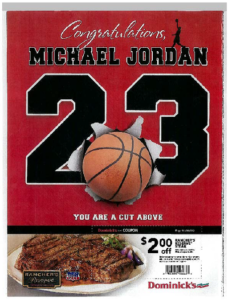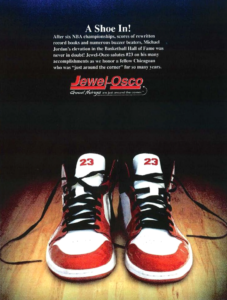ichael Jordan’s recent right of publicity victory over former Chicago-area grocer Dominick’s Finer Foods suggests that the unauthorized use of a celebrity’s name or likeness may come at a price—in this case, $8.9 million.
In 2009, Sports Illustrated magazine published a commemorative issue recognizing Jordan’s athletic achievements and celebrating his induction into the Basketball Hall of Fame. The magazine included congratulatory advertisements from several businesses, including Dominick’s.
 Dominick’s full-page ad featured the name MICHAEL JORDAN and Jordan’s jersey number, 23, on what appeared to be a red Chicago Bulls jersey. The advertisement incorporated the statement, “YOU ARE A CUT ABOVE,” and included a coupon for $2.00 off a RANCHER’S RESERVE-branded steak.
Dominick’s full-page ad featured the name MICHAEL JORDAN and Jordan’s jersey number, 23, on what appeared to be a red Chicago Bulls jersey. The advertisement incorporated the statement, “YOU ARE A CUT ABOVE,” and included a coupon for $2.00 off a RANCHER’S RESERVE-branded steak.
After the magazine was published, Jordan filed suit, claiming that Dominick’s had misappropriated Jordan’s name and persona in violation of the Illinois Right of Publicity Act (IRPA), among other state and federal trademark claims. Dominick’s had not obtained (or requested) Jordan’s consent to use his identity in connection with the advertisement. Additionally, by equating Jordan with a coupon for discounted, Dominick’s-branded steak, Jordan argued, Dominick’s had reduced Jordan’s endorsement value; Jordan noted that he has never approved the use of his identity or endorsement in connection with any grocery store goods or services, including with respect to those offered by Dominick’s. Moreover, Dominick’s used Jordan’s identity in connection with goods in conflict with Jordan’s fine dining restaurants—Michael Jordan’s The Steakhouse N.Y.C., and Michael Jordan’s Steakhouse.
Dominick’s maintained that, while its advertisement congratulated Jordan, Dominick’s had not used Jordan’s identity or implied his endorsement in connection with Dominick’s products or services. Dominick’s further argued that its advertisement is protected under the First Amendment.
The Northern District of Illinois determined that Dominick’s had infringed Jordan’s publicity rights, and granted Jordan’s motion for summary judgment on his IRPA claim. When the case went to trial, the only issue before the jury was the extent to which damages should be awarded. Dominick’s argued that a hypothetical agreement between the parties would have included a license fee of no more than $126,900. The jury disagreed, awarding $8.9 million in damages (a number much closer to the $10 million Jordan had sought).
The jury’s decision serves as a warning to anyone seeking to use a celebrity’s name, likeness, or other aspect of a celebrity’s persona without permission. Such use may result in drawn-out, expensive litigation, particularly if a celebrity values his endorsement deals and vigorously protects the commercial use of his identity. Moreover, damages may track whatever a jury determines the market value is of the celebrity’s endorsement, irrespective of how much an infringer actually benefited. (In this case, only two individuals were found to have used Dominick’s $2.00 coupon.) Corporate entities can minimize exposure by communicating these risks to employees, including non-senior management team members responsible for promotions and other advertising.
 Jordan is currently involved in another, near-identical lawsuit involving grocery store chain Jewel-Osco. The chain published a similar insert in the 2009 Sports Illustrated issue, using Jordan’s name and the number 23 alongside the store’s logo. Jewel-Osco argued that its advertisement, which did not promote a specific product, is “non-commercial speech” protected by the First Amendment; the Seventh Circuit disagreed, and refused to dismiss the case. A jury trial is scheduled to begin in December.
Jordan is currently involved in another, near-identical lawsuit involving grocery store chain Jewel-Osco. The chain published a similar insert in the 2009 Sports Illustrated issue, using Jordan’s name and the number 23 alongside the store’s logo. Jewel-Osco argued that its advertisement, which did not promote a specific product, is “non-commercial speech” protected by the First Amendment; the Seventh Circuit disagreed, and refused to dismiss the case. A jury trial is scheduled to begin in December.
Filed in: Advertising and Marketing, Legal Blog, Talent
September 4, 2015